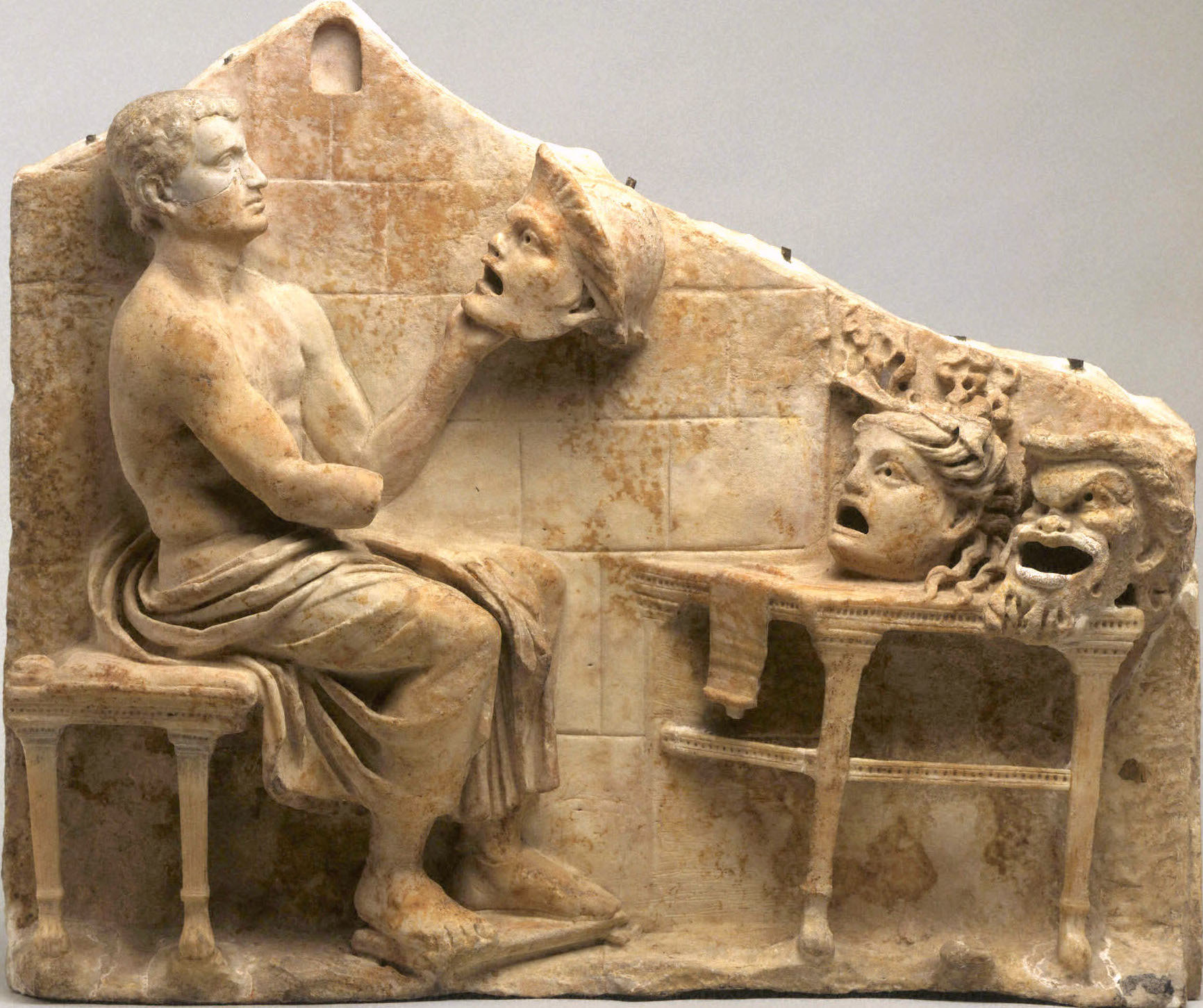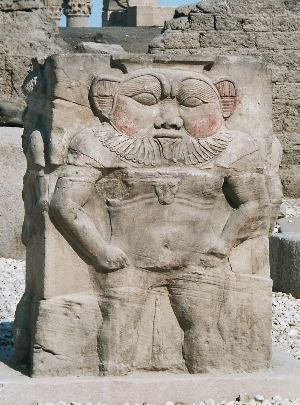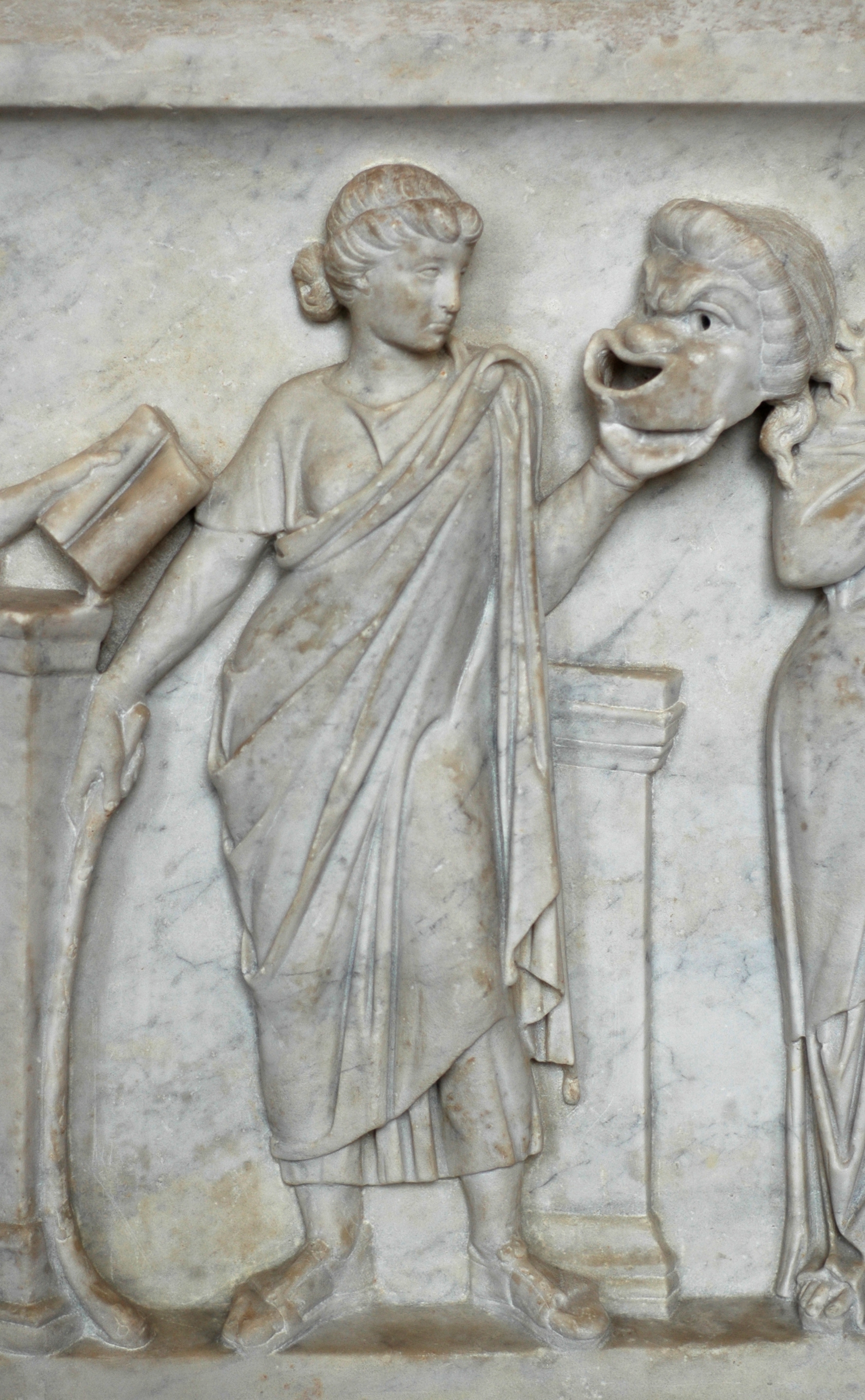As long as we’ve existed, humans have had a sense of humor. Ancient cultures shared similar ideas about what’s funny, and styles of humor reveal something about the human condition.
◊
Two men are watching a funeral procession. “Tell me,” says one man. “Who’s the dead guy?” The other man turns to him and says, “Well, the one in the coffin, of course!”
If that made you chuckle, you’re not alone. Greeks in the 4th century BCE thought it was funny, too. That’s right, the joke is thousands of years old! Talk about aging well…
It’s one of around 256 compiled by two Greeks, Hierocles and Philagrips, that appears in the oldest existing joke book, Philogelos (roughly translated as “The Joker” or “Laughter Lover”). But the Greeks weren’t just into one-liners; they also enjoyed comedic plays. Satirizing politicians and other well-known figures, skewering social norms, and even divinities were fodder for playwrights like Aristophanes. For example, Lysistrata tells the tale of the eponymous woman who, in an effort to end the Peloponnesian War, convinces her female compatriots to withhold sex until their husbands negotiate peace.
For more on Buddha and other historical visionaries, check out the MagellanTV documentary Genius of the Ancient World.
Social commentary wasn’t the only tool in Aristophanes’s comedic tool kit. Not above some low-brow humor, Aristophanes goes for jokes about defecation, passing gas, and other bodily functions in The Frogs – all the stuff that boys (and men) find endlessly giggle-worthy.
‘Who ya callin’ funny?’ From Sumer to Greece and Rome
The Greeks weren’t the only ones who appreciated humor of all sorts, and they weren’t the first to record their jokes. The oldest known joke in the world, which features a blast of gas comedy, is attributed to 20th century BCE Sumerians: “Something which has never occurred since time immemorial; a young woman did not fart in her husband’s lap.” (Why, oh why are fart jokes funny?)
Then there were the ancient Egyptians, who documented funny stories and jokes in hieroglyphics and on ostraca (pieces of pottery on which writing is scratched). There’s a scene at the temple of Hatsheput at Deir el-Bahri, for example, which shows the rotund queen and a donkey. The caption reads, the donkey that had to carry the queen, which contemporaries found funny enough to duplicate in sketches of their own.
Graffiti from ancient visitors to the Colossi of Memnon in Egypt include such quips as I cannot read the hieroglyphics, and I visited and I did not like anything but the sarcophagus! Even in ancient times, haters gotta hate.
One might also make the case that ancient Egyptians appreciated humor involving something akin to what we now think of as social justice. In “Tale of the Eloquent Peasant” (c. 19th century BCE), for example, a villain who steals a peasant’s goods by trickery leads said peasant to make a series of appeals for justice. The irony in making a lowly peasant eloquent arguably enhances the central theme of the story, namely that justice is not only for the ruling elites.
In Eastern cultures, we find Buddha using wit to make a point. There’s a parable in one of the Pali Canon texts, in which Buddha shows up a rude young man who spat out an insult:
“You have no right to teach others. You just say pretty things and then ask for food and money!”
Buddha calmly replied, “If you buy a gift for someone, and that person does not accept it, to whom does the gift belong?”
The young man considered the question, and said, “It belongs to me, since I bought it.”
“Exactly,” agreed Buddha. “And you are angry with me and insulted me, but I do not accept them, so they belong to you.”
 Relief of the poet, Meander and new comedy masks at the Princeton Art Museum (Credit: Dave & Margie Hill, via Wikimedia Commons)
Relief of the poet, Meander and new comedy masks at the Princeton Art Museum (Credit: Dave & Margie Hill, via Wikimedia Commons)
Later in ancient history, we find humor that builds off the foundations of Greek culture. Romans like the first emperor Augustus, Cicero, Juvenal, Catullus, and Horace made more or less successful attempts at humor through irony, sarcasm, ridicule, exaggeration, clever insults, puns, and word play, among other devices. In most cases, the aim was to criticize society’s vices. The Romans also enjoyed comedic plays by the likes of Plautus and Terence.
As with other aspects of society, the Romans borrowed heavily from their Greek predecessors for comedic styles – and accessories. The well-known comedy and tragedy masks originated in the ancient Greek theater and were adopted by the Romans.
Turning to another culture, this example of Viking dark humor from the Droplaugarsona Saga, circa the 13th century, might still elicit a chuckle today: After having his lower lip cut off in battle, the Viking Helgi says to his enemy, I have never been particularly handsome, and you haven’t exactly improved my attractiveness.
And some comedy translates handily from one culture to another of the same era, based in part on shared experiences and structural features. For example, during the 2011 Tahrir Square protests in Cairo, the following mordant joke was making the rounds: “Nasser was killed by poison, Sadat by a bullet, and Mubarak by Facebook.” You don’t have to be Egyptian to get it.
Made You Laugh! (Or Maybe Not – Some Jokes are Contextual)
Nevertheless, what’s funny to some just doesn’t translate, whether we’re talking about the technical knowledge required for some jokes, or the cultural context or linguistic proficiency required to understand why someone would be amused by a particular quip.
Indeed, it’s actually striking that quite a bit of what makes us laugh cuts across cultures and generations, particularly since so much of it seems to be context-dependent or outright subjective. For example, some comedy depends on language. Understanding the nuances of another culture and its language may be required to see how this example from a joke about Cicero is funny:
A Roman senator was late for an important meeting. When he finally arrives, he finds his way to his seat and leans over to the senator seated next to him. “Hey,” the tardy senator whispers. “What’s Cicero talking about?”
The other senator responds, “I don’t know. He hasn’t gotten to the verb yet.”
Now consider this joke, based on ambiguous language: For those of you with children and don’t know it, we have a nursery downstairs. Non-native English speakers – and even many whose first language is English – likely struggle to grasp why it’s silly. The phrase, “and don’t know it,” is funny in the context of the sentence construction, because “it” can be read as referring to having children or having a nursery downstairs. Hence, the ambiguity that generates the silliness.
 (Credit: Johnnypluckman, via Wikimedia Commons)
(Credit: Johnnypluckman, via Wikimedia Commons)
Then there is this science joke, which is probably not funny to a non-scientist, even though it relies on word play that we can easily grasp if we understand the terms:
What did the stamen say to the pistil?
“I like your style!”
Why’s It Funny?
Cicero wrote a text on humor, which includes a tutorial on how to use it in order to disarm, if not defeat, political and legal opponents. Cicero isn’t the only ancient figure who theorized about humor. In fact, his work builds upon Plato, who first developed the theory of superiority: We laugh at those we find inferior or ugly. When we tease, mock, or make someone the butt of a joke, we exhibit this issue. But taking delight in diminishing another also diminishes us, which is one reason Plato did not think highly of comedy. Aristotle agrees that the malicious feeling of superiority over others is indicative of a failure in the one enjoying that feeling, but he does see some benefit in such humor, provided it’s modulated.
The Name of the Rose, Umberto Eco’s 1980 debut novel (adapted later in the 1986 film of the same name), involves “On Comedy,” a lost book from Aristotle’s Poetics.
Of course, many of us aren’t amused by jokes that demean or belittle others. For example, some context-dependent humor from as recently as the 1990s has lost its supposed comedic punch as norms and attitudes changed. Racist, homophobic, and misogynistic jokes that were staples in the acts of many comedians only a few decades ago were arguably never funny, but surely wouldn’t draw crowds today.
Still, there are examples of humor across the globe and throughout history that reflect what many might consider justified superiority. Skewering social injustices, political corruption, or celebrity hubris can support social bonding and reinforce constructive values. Cicero’s work on comedy and the ancient Egyptian parable about the peasant, for example, clearly reflect how tools like hyperbole can be effective in revealing important social truths. In other words, there is something deeply satisfying about righteous irreverence and sticking it to The Man.
When norms are shared, what’s comical can also serve as an educational tool. A good example comes from Mengzi (Master Meng), the 4th century BCE Confucian thinker called the Second Sage:
There was a man who stole chickens from his neighbor daily. Someone said to him, “This is not the way of a gentleman.”
“Don’t be so harsh,” the man replied. “I’ll just steal one chicken every month for the coming year, okay?”
“I think that God’s got a sick sense of humor”
Depeche Mode may be right. In ancient cultures across the world, even the gods were in on it. For instance, the ancient Egyptians had Bes, whose apparently comical appearance contributed to his status as the god of humor. (Perhaps tellingly, he was also the god of sexuality, fertility, childbirth, and war.)
The Greeks had Gelos, who also happened to be buddies with party gods, Dionysus and Komos. (The Greeks also had Thaleia, the muse who presided over comedy. It is after her that the comedy mask is named.) Then there’s Loki, the Norse trickster, and Mirtha, the Hindu goddess of laughter and merriment. The ancient Mayan god Yum Kaax, like Gelos, was not only associated with humor but also fertility. (What’s up with that? Is sex really that funny?)

Bes, the ancient Egyptian god of humor, at Dendera Temple in Egypt
(Credit: Hajor, Wikimedia Commons)
Long before the Borscht Belt comedy circuit produced the likes of Sid Caesar, there was The Big Kahuna Himself. Although most of the Hebrew Bible presents Yhwh as a vengeful, wrathful, and maybe even mercurial deity (just ask Job), that doesn’t mean there’s zero stuff to laugh at in the text itself. Just consider this comedy gold from 2 Chronicles 21:20:
Jehoram was thirty-two years old when he became king, and he reigned in Jerusalem eight years. He passed away, to no one’s regret…
Lest we believe Yhwh is utterly and exclusively about gravitas and vengeance, remember the point made earlier about a sort of righteous laughter associated with jabs at foibles like hubris and moral bankruptcy. Now check out Psalm 37:12-13:
The wicked plot against the righteous, and gnash their teeth at them; but the Lord laughs at the wicked, for he sees that their day is coming.
What’s the Hebrew for “Payback’s a bitch”?
Add to that the fact that The Big Yah-Way knows how to party, which is a relative of the lighthearted fun we expect from certain types of comedy. Though drinking to excess caused trouble for the likes of Noah and others in the Biblical hit parade, there’s no divine command to abstain altogether. That’s a relief, because some jokes are better with a glass of wine.
 Thalia sarcophagus at the Louvre (Credit: Wikimedia Commons)
Thalia sarcophagus at the Louvre (Credit: Wikimedia Commons)
'Don’t call me Shirley'
Ancient cultures found situations, words, and wordplay funny. They often tried to think through what makes something funny, the purpose of humor, and how to appropriately value and respond to it. There was also a panoply of gods associated with humor, which gives us a glimpse into its universality.
When something is funny we laugh. It’s always been that way. Humor is as integral to the human condition as tragedy, but laughing so hard that you cry is more fun than crying on its own. So, even if we might not agree on what or who is funny, we can agree that funny is here to stay. In the immortal words of Porky Pig, “That’s all folks!”
Ω
Mia Wood is a philosophy professor at Pierce College in Woodland Hills, California, and an adjunct instructor at the University of Rhode Island, Community College of Rhode Island, and Providence College. She is also a MagellanTV staff writer interested in the intersection of philosophy and everything else. She lives in Little Compton, Rhode Island.
Title image: Laughing Budai at Ving Trang Pagoda, Vietnam (Credit: Milei Vencel, via Wikimedia Commons)

